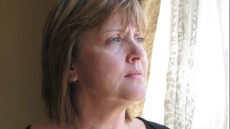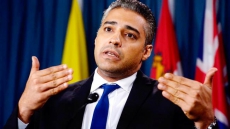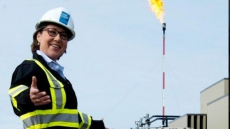TORONTO — People hunting for new cellphone plans can expect to pay a little more each month if they sign up with one of Canada's biggest three wireless providers — Telus, Rogers and Bell recently announced price hikes while pointing an accusatory finger at the low Canadian dollar.
But some industry watchers are skeptical, noting the big telecoms tend to have methods to protect themselves from foreign currency fluctuations.
"If the exchange rate is such a big deal, how come we didn't see lower prices when the dollar went up?" said David Christopher, a spokesman with the OpenMedia advocacy group.
New customers signing monthly contracts with Bell, Rogers or Telus now pay $5 more. Each company also lowered savings by between $10 and $15 for customers who already own a device.
Telus raised prices partly because it has to pay more for network components thanks to the weaker loonie, said Emily Harner, a company spokeswoman. She also pointed to the need to spend millions of dollars annually to keep up with customer demand for wireless data.

The other two companies have echoed concerns over the economy. For months, the loonie has been trading below 80 cents US, and has been hovering around 70 cents in the past few weeks.
The companies could have raised prices to make up for the extra cost of doing business. They pay for nearly all of their infrastructure costs in either U.S. dollars or the euro, said Iain Grant, the managing director of SeaBoard Research, a technology research and strategy consulting company.
But some believe consumers are being hoodwinked into believing the loonie is responsible for higher cellphone plans and suggest, in fact, it's a desire for higher profits.
"It's a little suspicious that these big, sophisticated, publicly traded companies that are in the business of, you know, managing their risk and maximizing profit are blaming something that they likely foresaw on a price increase, across the board, in a relatively short amount of time," said Geoff White, external counsel to the Public Interest Advocacy Centre.

All three companies engage in foreign exchange hedging programs, he said, based on an analysis of their 2014 annual statements and most recent third-quarter reports.
"It's like paying premiums to lock in a certain foreign exchange rate in the future so that you're guaranteed you'll be paying a certain amount," said White.
It's impossible to know exactly how successful those initiatives have been based on the information in those reports, he said, but "it looks like they've been able to do it quite effectively."
But Grant says that when the loonie is forecast to remain low compared to the U.S. dollar for a longer time frame, "the currency swap options are more limited" and expensive.
"The cost of these hedges has also increased dramatically with the decline in the dollar," said Jason Laszlo, a Bell spokesman. Telus and Rogers did not respond to questions about foreign currency protection.
The companies could have opted to lay off workers or accept lower profits until the loonie recovers, Grant added.
Instead, they chose to pass the cost on to consumers in a move that likely benefits the company's bottom line.
"Higher prices make for happier financial analysts, which usually translate to higher share prices," said Grant.
These simultaneous price hikes fit a pattern that Canadians have grown accustomed to, said Christopher, regardless of where the dollar stands. The trio of telecoms similarly increased prices for monthly plans for new customers over a two-month span in 2014.

The three big wireless providers can get away with such increases because there's a lack of competition in most provinces and territories, he said. In Quebec, Saskatchewan and Manitoba, where a fourth carrier operates, the companies are not implementing the price increases.





